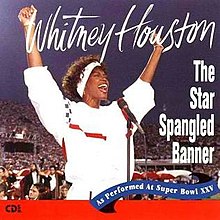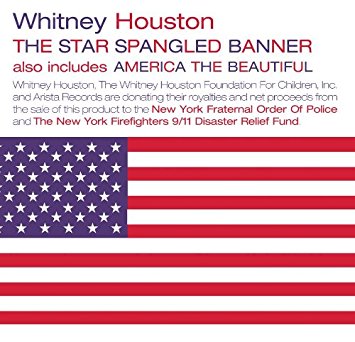“The Star Spangled Banner” is a charity single recorded by American singer Whitney Houston to raise funds for soldiers and families of those involved in the Persian Gulf War. Written by Francis Scott Key, “The Star-Spangled Banner” is the National Anthem of the United States. The musical arrangement for Whitney Houston’s rendition was by conductor John Clayton. The recording was produced by music coordinator Rickey Minor, along with Houston herself. The recording was included in the 2014 CD/DVD release, Whitney Houston Live: Her Greatest Performances and the US edition of the 2000 release, Whitney: The Greatest Hits.
Traditionally performed at sports games in the US, “The Star Spangled Banner” was performed by Houston at the now demolished Tampa Stadium for Super Bowl XXV in 1991. Houston donated her portion of the proceeds.
After the September 11, 2001 attacks, Arista Records re-released Houston’s “The Star Spangled Banner”. She once again donated her share of the royalties, as did Arista Records, towards the firefighters and victims of the terrorist attacks. This time the single peaked at #6 on the US Hot 100, and was certified platinum by the RIAA. This made Houston the first musical act to take the national anthem Top 10 in the US, and have it certified platinum. The 2001 re-release of the single was Houston’s last Top Ten hit on the US Hot 100 during her lifetime.
The Super Bowl XXV performance
“If you were there, you could feel the intensity. You know, we were in the Gulf War at the time. It was an intense time for a country. A lot of our daughters and sons were overseas fighting. I could see, in the stadium, I could see the fear, the hope, the intensity, the prayers going up, you know, and I just felt like this is the moment. And it was hope, we needed hope, you know, to bring our babies home and that’s what it was about for me, that what I felt when I sang that song, and the overwhelming love coming out of the stands was incredible.”
—Whitney Houston talking about how she felt at the moment when she belted out the national anthem at Super Bowl XXV.
On January 27, 1991–10 days into the Persian Gulf War—Whitney Houston took the field at Tampa Stadium and performed “The Star Spangled Banner”, backed by the Florida Orchestra along with music director Jahja Ling, before 73,813 fans, 115 million viewers in the United States and a worldwide television audience of 750 million. The pregame program including Houston’s performance of the national anthem was produced by Bob Best for the National Football League and televised live on American Broadcasting Company (ABC) in the United States. Because of the Gulf War situation, this marked the first time the Super Bowl would be telecast in most countries around the world. Outside of North America and the United Kingdom, the Super Bowl was broadcast for the first time in such countries as Australia, Russia, and most other countries. Houston’s performance was later used as a music video of the song.

The patriotic feeling of Houston’s stirring cover resonated strongly with the public. Due to overwhelming response to her rendition, Arista Records announced that it was released as a single and video of her performance, and all profits would be donated to a charity connected with the war effort, to be selected by Houston at a later date. Afterward Houston said that “I went back up in the sky booth and watched the game. It wasn’t until a day or two later that I realized the whole country was in an uproar.” According to Clive Davis, Arista Records’ decision to release the record came after three days of being flooded with phone calls from all over the country from people asking to buy copies of the single. Hundreds of radio stations around the country aired the song from tapes they had recorded from the TV broadcast. Eventually, the CDs, audio cassettes of the performance were released on February 12, and its video singles on February 17, 1991 in the United States by Arista Records, respectively. And the proceeds―$531,650, a combined contribution from the Whitney Houston Foundation for Children, Inc., Arista and Bertelsmann Music Group Distribution which donated all their royalties and profits from the sale of those―went to the American Red Cross Gulf Crisis Fund, which provided aid to US military personnel, their families and war victims in the region. Houston was named to the American Red Cross Board of Governors. The audio single was also released in some countries including the Netherlands but its shipments were very small.
On May 16, 2000, the song and its video were released on CD, VHS and DVD of her Whitney: The Greatest Hits. The song was only included in the domestic version of the album.
According to Arista, Houston, who had been in the process of picking songs for the upcoming album with then Arista CEO L.A. Reid before September 11 attacks, shortly after the attack, decided to do her part to help the country recover by agreeing to have her 1991 rendition of “The Star Spangled Banner” re-released. So, it was reissued as a commercial CD single on September 26, 2001 by Arista Records, with proceeds going to the New York Firefighters 9/11 Disaster Relief Fund and the New York Fraternal Order of Police; the single also included her version of “America the Beautiful.” With releasing of the single, Reid said that “In a time of tragedy, Whitney Houston’s recording of our National Anthem has comforted and inspired our nation.”
[wiki] https://en.wikipedia.org/wiki/The_Star-Spangled_Banner_(Whitney_Houston_recording)
“Whitney was at the height of her vocal powers, and her performance of the song was electrifying,” Houston’s label head and industry icon Clive Davis wrote in his 2013 memoir, The Soundtrack of My Life. “It was soulful, passionate, supremely confident, and rousing.” As she hit the final climactic high note—an E-flat above middle C—on the word “free,” four F-16 fighter jets performed a ceremonial fly-by in the skies above. “It was a moment of unforgettable drama and pride,” writes Davis.
Only a genius could take a song that, by design, belongs to all citizens, and make it her own. Make no mistake; this was not a selfish act, but a selfless one.


Recent Comments